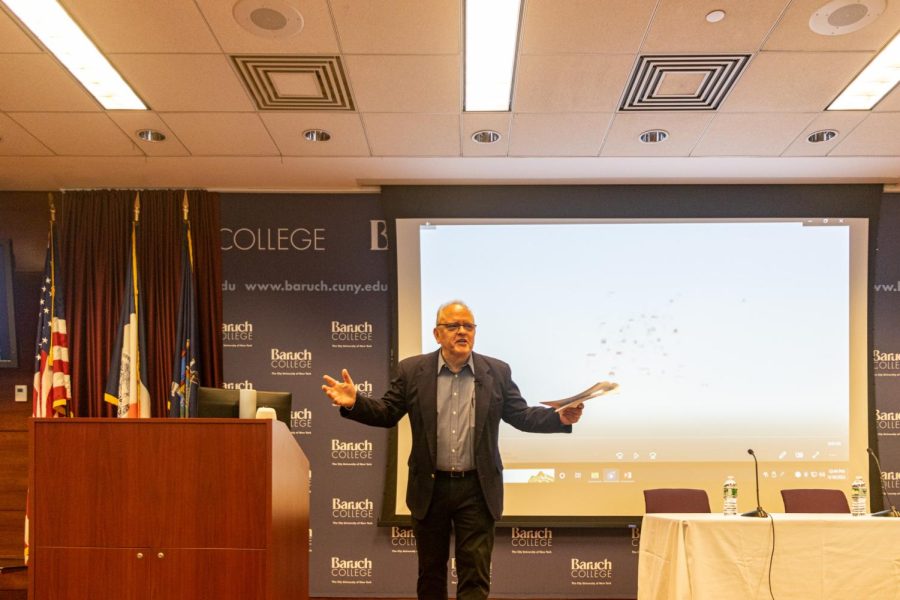Weissman Center welcomes alumnus to discuss international business career
May 1, 2023
The Weissman Center for International Business welcomed Baruch College alumnus Lawrence Fannin to discuss his career in international business in the center’s latest installment of its “Mitsui Lunch-Time Forum” series on April 18.
Titled “A Day in the Life of International Business,” the event allowed Fannin to share his professional expertise in international business and go over the importance of trade compliance.
Fannin is the director of trade compliance and the export commissioner for the Americas at Carl Zeiss AG, a German technology company with “offices in probably 50 to 75 countries around the world.” He worked in different specialties such as international trade, supply chain and logistics functions for global businesses, but he developed his career’s foundation starting with his college education.
Growing up in New York City, Fannin developed a passion for international trade while studying at Baruch. He worked in a factory in Manhattan and attended full-time night classes in pursuit of an international business degree.
After obtaining his Bachelor of Business Administration in international marketing, he studied to receive another bachelor’s degree in finance but didn’t complete his course work.
Fannin said his international marketing class changed his life. It helped him develop a curiosity toward international business.
After he graduated from Baruch, Fannin quit his day-time factory job and found employment on 29th Street at an international trade finance company called “JA McDonald Inc.” He said he was hired as the assistant to the assistant traffic manager. He was later promoted to the purchasing department.
“To be honest, I learned 90% of everything that I know about international operations in my 13 years at the company,” Fannin said.
After leaving the company, the Baruch alumnus later founded his own trading company using the knowledge he learned from JA McDonald.
“I hit the ground running on Jan. 1, 1991,” Fannin said. “My first year sales were astounding: $1.1 million.”
But Fannin said the circumstances of international politics, especially in the post-Cold War era, forced his business to take an ugly turn. He ended up losing his company. He added that he learned, he was not the right person to be running a trading company all by himself.
Fannin was recruited by companies with strong international presences, such as the paper company Sappi Ltd., the electronics company Harman Kardon, which was founded by fellow Baruch alumnus Sidney Harman, and the imaging products company Nikon Corp. Eventually, he found his place at Carl Zeiss.
Fannin noted that the company is celebrating its 175th year in business, “making world premiere optics, microscopes, eyeglasses, industrial measuring machines and semiconductor manufacturing machines.” He added that Carl Zeiss’s products are used to manufacture 80% of the world’s semiconductors.
While the company works toward innovation, Fannin described Carl Zeiss as “a company that cares about humanity,” adding it’s “basically a nonprofit organization, even though we make millions in profits.”
“We are 100% owned by a foundation, so profits have never been our primary goal,” Fannin said. “We are required to give 20 to 30% of our profits back into society, to researchers trying to cure cancer, to engineers trying to develop sustainable green energy, to hospitals, to research laboratories [and] to scientific based colleges and universities.”
To students attending the forum, Fannin said having the knowledge of supply and demand management is a core requirement for the company and for international business.
When it comes to trade compliance, he advised the audience to “do it right the first time.” To explain, companies seek to use their time efficiently instead of wasting it. Plus, not everyone gets to have a second chance at doing something, so a person should give all they have in one go.







